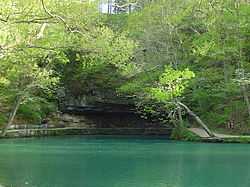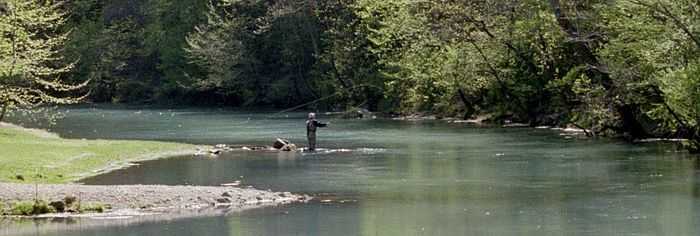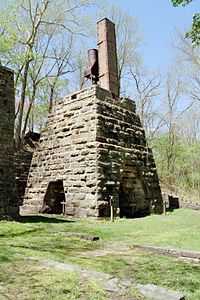Maramec Spring
| Maramec Spring | |
| River | |
 The spring opening is below the pool surface beneath the overhanging bluff of Gasconade Dolomite | |
| Country | United States |
|---|---|
| State | Missouri |
| Region | Ozark Plateau |
| Source | Dry Fork watershed |
| - elevation | 773.97 ft (236 m) USGS |
| Mouth | Meramec River |
| - location | near St. James, Phelps County, Ozark Plateau, Missouri |
| - coordinates | 37°57′20″N 91°31′57″W / 37.95556°N 91.53250°WCoordinates: 37°57′20″N 91°31′57″W / 37.95556°N 91.53250°W USGS |
| Length | 0.87 mi (1 km) Missouri Department of Conservation |
| Discharge | for Maramec Spring |
| - average | 153 cu ft/s (4 m3/s) USGS 1923-1985 |
| - max | 770 cu ft/s (22 m3/s) |
| U.S. NNL | Designated: 1971 |

Maramec Spring is located on the Meramec River near St. James in the east-central Ozarks of Missouri. The fifth largest spring in the state with an average daily discharge of 153 cubic feet (4.3 m3) of water per second, it is part of an area known for its karst topography with many springs and caves. The spring and 1800 acres (7.3 km²) are privately owned by the James Foundation which maintains the area as a park open to the public. The Missouri Department of Conservation operates a trout hatchery and fishery at the spring. There are also ruins of a historic iron works, which took advantage of the available hydropower. The spring was declared a National Natural Landmark in October 1971.[1]
Description
The spring has an average daily discharge of about 100 million gallons (363 million liters)USGS. The natural history of the spring and the history of the iron works are highlighted in a museum operated by the James Foundation at the site. Another museum in the park features agricultural tools utilized in the area over the years.
The park also offers a scenic drive that offers a glimpse into the life in the area while the iron works were operating. The drive takes the viewer to a scenic overview of the park, an old cemetery populated with employees of the works, the iron pit mine, and locations of a few homesteads. The park is also covered with ample picnic areas, including pavilions that are suitable for events.
Maramec Iron Works

Adjacent to the spring are the ruins of the Maramec Iron Works. The first commercially viable iron works in the US west of the Mississippi, they produced iron from 1827 to 1891. During the US Civil War, it produced iron for cannonballs and James B. Eads' gunships, which were built in St. Louis near the mouth of the river. The iron works used the flow of water from the spring to power its machinery to process high-grade iron ore quarried in the form of hematite from a nearby pit.[2]
In October every year, the James Foundation hosts Old Iron Works Days, usually the second or third weekend of the month. This event features arts, crafts, foods, displays and presentations that provide a view of life in the area during the operation of the iron works.
Recreational activities
The park is one of four trout parks in Missouri and allows fishing most of the year. Harvesting season starts March 1 each year and runs until the beginning of October, while the catch and release season runs during the winter months. The stream is restocked every day during fishing season from the 100,000 trout produced by the hatchery each year.[3]
There are 58 campsites in the park, ten of which have electric hook-ups. The park has numerous picnic sites, six reserveable picnic shelters, and multiple playgrounds.[4]
See also
- List of Missouri rivers
- List of Arkansas rivers
- List of Ozark springs
References
- ↑ "National Natural Landmark summary". National Park Service. February 5, 2004. Retrieved 2009-04-26.
- ↑ Ludwig, Stephen (1977). "Maramec Iron Works". Bittersweet (Lebanon High School) 2 (2). Retrieved 2009-04-26.
- ↑ "Maramec Spring Fish Hatchery and Trout Park". Missouri Department of Conservation. 2009. Retrieved 2009-04-26.
- ↑ "Camping at Maramec Spring Park along the Meramec River". James Foundation. Retrieved 2009-12-15. Et al.
External links
| Wikimedia Commons has media related to Maramec Spring. |
- Official site: MaramecSpringPark.com